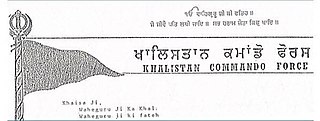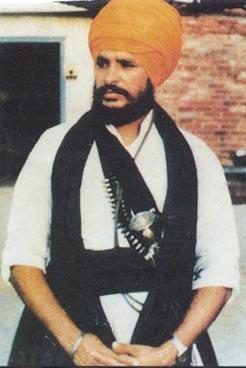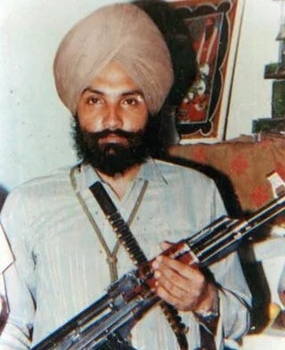Related Research Articles

The Khalistan movement is a separatist movement seeking to create a homeland for Sikhs by establishing an ethno‐religious sovereign state called Khalistan in the Punjab region. The proposed boundaries of Khalistan vary between different groups; some suggest the entirety of the Sikh-majority Indian state of Punjab, while larger claims include Pakistani Punjab and other parts of North India such as Chandigarh, Haryana, and Himachal Pradesh. Shimla and Lahore have been proposed as the capital of Khalistan.

Jarnail Singh Bhindranwale was an Indian militant. He was the leading figure of the Khalistan movement, although he did not personally advocate for a separate Sikh nation.

Babbar Khalsa International, better known as Babbar Khalsa, is a Sikh militant organisation that aims to create an independent Sikh nation of Khalistan in the Indian and Pakistani states of Punjab. It has used armed attacks, assassinations and bombings in aid of that goal, and is deemed to be a terrorist entity by various governments. Besides India, it operates in North America and Europe, including Scandinavia.

Shiromani Akali Dal (Amritsar) is a hard-line Sikh nationalist political party led by Simranjit Singh Mann, it is a splinter group of the Shiromani Akali Dal in Punjab, India. They use 'Balti', the Punjabi term for bucket as their official election symbol. Shiromani Akali Dal (Amritsar) was formed on 1 May 1994. The party has seen a resurgence in support after the deaths of Deep Sidhu and Sidhu Moose Wala who were supporters and seen as sympathetic to the cause of Simranjit Singh Mann. Their 2022 Lok Sabha victory after more than two decades has been viewed as a resurgence in a political vacuum due to collapse of other traditional political parties in Punjab. The last major victory for Shiromani Akali Dal (Amritsar) was in the 1989 Lok Sabha elections, where the party and their allies won 10 out of 13 seats from Punjab.

Talwinder Singh Parmar or Hardev Singh Parmar was a Sikh militant accused by Indian government of masterminding the 1985 Air India Flight 182 bombing, which killed 329 people. It was the worst single incident of aviation terrorism in history until the September 11 attacks in the United States. In addition, another bomb was meant to explode aboard Air India Flight 301 in Japan the same day, but it exploded while the plane was still grounded, killing two people. Parmar was also the founder, leader, and Jathedar of Babbar Khalsa International (BKI), better known as Babbar Khalsa, a Sikh militant group involved in the Khalistan movement.

Dal Khalsa is a radical Sikh organisation, based in the city of Amritsar. The outfit was formed in 1978 by Gajinder Singh, the hijacker of Indian Airlines Flight 423. It came to prominence during Insurgency in Punjab, India along with Jarnail Singh Bhindranwale in 1981. Members of the Dal Khalsa have also been accused of the assassination of Lala Jagat Narain. The primary aim of Dal Khalsa is to form a Punjabi Sikh nation state called Khalistan.

The Khalistan Commando Force (KCF) is a Sikh Khalistani militant organisation operating in the state of Punjab, India with prominent members based in Canada, United Kingdom and Pakistan. Its objective is the creation of a Sikh independent state of Khalistan through armed struggle. KCF is also responsible for many assassinations in India, including the 1995 assassination of Punjab Chief Minister Beant Singh. It is designated as a Terrorist Organisation by the Government of India.

The Insurgency in Punjab was an armed campaign by the militants of the Khalistan movement from the mid-1980s to the mid-1990s. Economic and social pressures driven by the Green Revolution prompted calls for Sikh autonomy and separatism. This movement was initially peaceful, but foreign involvement and political pressures drove a heavy handed response from Indian authorities. The demand for a separate Sikh state gained momentum after the Indian Army's Operation Blue Star in 1984 aimed to flush out militants residing in the Golden Temple in Amritsar, a holy site for Sikhs. Terrorism, police brutality and corruption of the authorities greatly exacerbated a tense situation. By the mid-1980s, the movement had evolved into a militant secessionist crisis due to the perceived indifference of the Indian state in regards to mutual negotiations. Eventually, more effective police and military operations, combined with a policy of rapprochement by the Indian government and the election loss of separatist sympathizers in the 1992 Punjab Legislative Assembly election, largely quelled the rebellion by the mid-1990s.

The Khalistan Liberation Force (KLF) is a Khalistani separatist militant organization based in the Indian state of Punjab. Its motive is the creation of a sovereign Sikh state called Khalistan via armed struggle. The KLF is one of the key fighting forces of the Khalistan movement. It was responsible for assassinations, abductions and military engagements with the Indian Armed Forces during the Insurgency in Punjab. The KLF is listed as a designated terrorist group by the Republic of India.

Jathedar Sukhdev Singh Babbar was the militant and co-leader of Babbar Khalsa (BK), a Sikh militant organisation involved in the pursuit of creating a Sikh nation named as "Khalistan" and generally believed responsible for the 1985 bombing of Air India Flight 182, although Sukhdev was never named as being involved. BK was founded by Talwinder Singh Parmar, himself, and Amarjit Kaur. He commanded BK continuously for 14 years until he was killed in 1992. He was a member of the AKJ.
The Bhindranwale Tiger Force of Khalistan (BTFK) is a one of several major separatist organizations involved in the Khalistan movement during the Punjab insurgency. The BTFK's main aim was to establish a Sikh homeland called Khalistan. At its peak, the BTFK's membership totaled 500 members and remained the strongest pro-Khalistan group in Tarn Taran Sahib, which was the epicenter of violence during the Punjab insurgency.

Sukhdev Singh Dhillon, best known as General Labh Singh and also known as Sukha Sipahi and just Labh Singh, was a former Punjab police officer turned militant who took command of the Khalistan Commando Force after its first leader, Manbir Singh Chaheru, was arrested in 1986.

Bhai Manbir Singh Chaheru Also known as General Hari Singh was the Indian founder and first leader of the militant organisation Khalistan Commando Force.

The International Sikh Youth Federation (ISYF) is a proscribed organisation that aims to establish an independent homeland for the Sikhs called Khalistan. It is banned as a terrorist organisation under Australian, Japanese, Indian, Canadian and American counter-terrorism legislation. The Government of India has declared it a terrorist organisation. While banned, the organization continues to receive financial support from many Sikh people based in Canada, the United States, and the United Kingdom.

Gurbachan Singh Manochahal was Jathedar of Akal Takhat Sahib who founded the Bhindranwale Tiger Force of Khalistan in 1984.

Gurjant Singh Budhsinghwala was a Sikh militant and the third Jathedar of the Khalistan Liberation Force. Budhsinghwala's organization, KLF, was one of the most active Sikh militant groups of the time. Budhsinghwala had KLF join the Sohan Singh Panthic Committee and partnered with Khalistan Commando Force (Panjwar), Babbar Khalsa, Bhindranwale Tiger Force (Sangha), and Sikh Student Federation (Bittu) in militant actions. Budhsinghwala is also credited with making KLF one of the strongest and most lethal militant groups.

The Sarbat Khalsa of 1986 was one congregation of the Guru Khalsa Panth, including the Damdami Taksal, Akal Takht, Panthic Committee (Manochahal), Panthic Committee (Zaffarwal), Kharku Sikhs, Tarna Dal (Hariabelan), Tarna Dal, Bidhi Chand Dal and the Shiromani Budha Dal.

Sukhwinder Singh Sangha was a Sikh Kharku and head of a faction of Bhindranwale Tiger Force of Khalistan. Sangha was a popular Kharku, known for his help of civilians. He was awarded the title of the "20th-century Hari Singh Nalwa" by Damdami Taksal and other Sikh Jathas.
On October 3, 1986, Kharkus of Khalistan Commando Force, a Kharku group led by Labh Singh, made an attempt on the life of Director General of Police in Punjab Julio Ribeiro in Jalandhar within the Punjab Armored Police headquarters. Ribeiro was wounded in the attack along with his wife. Ribeiro's wounds were minor, but his wife was hospitalized. 2 officers were killed and 2 were seriously wounded in the attack. All the attackers escaped unhurt.
References
- ↑ Minahan, James (2002). Encyclopedia of the stateless nations. 4: S - Z. Westport, Conn. London: Greenwood Press. p. 2151. ISBN 978-0-313-32384-3.
SIKHS: All-India Sikh Students Federation (AISSE); Babbar Khalsa International (BKI); Khalistan Liberation Army; Khalsa Dal; Sikh Youth Federation; Panthic Committee; Pure Tigers; Khalistan Liberation Front (KLF); Council of Khalistan; Eternal Party (Akali Dal); All-India Shiromani Akali Dal; Panthic Committee; Khalistan Commando Force (KCF); Bhindranwale Militant Group; Sikh International Organization (SIO); Shaheed Khalsa Force (SKF); Sikh Youth Federation (SYF); Bhinderanwala Tiger Force; Saheed Khalsa Force; Khalistan Liberation Tiger Force; Khalistan National Army (KNA); Saheed Khalsa Force; Azad Khalistan
- 1 2 3 4 5 6 Fair 2005, p. 128.
- ↑ Home Office - Proscribed terrorist groups in the UK Archived 2007-03-01 at the Wayback Machine
- ↑ EU list of terrorist groups
- ↑ Canadian listing of terrorist groups Archived 2006-11-19 at the Wayback Machine
- ↑ Minahan, James (2002). Encyclopedia of the stateless nations. 4: S - Z. Westport, Conn. London: Greenwood Press. p. 2151. ISBN 978-0-313-32384-3.
SIKHS: All-India Sikh Students Federation (AISSE); Babbar Khalsa International (BKI); Khalistan Liberation Army; Khalsa Dal; Sikh Youth Federation; Panthic Committee; Pure Tigers; Khalistan Liberation Front (KLF); Council of Khalistan; Eternal Party (Akali Dal); All-India Shiromani Akali Dal; Panthic Committee; Khalistan Commando Force (KCF); Bhindranwale Militant Group; Sikh International Organization (SIO); Shaheed Khalsa Force (SKF); Sikh Youth Federation (SYF); Bhinderanwala Tiger Force; Saheed Khalsa Force; Khalistan Liberation Tiger Force; Khalistan National Army (KNA); Saheed Khalsa Force; Azad Khalistan